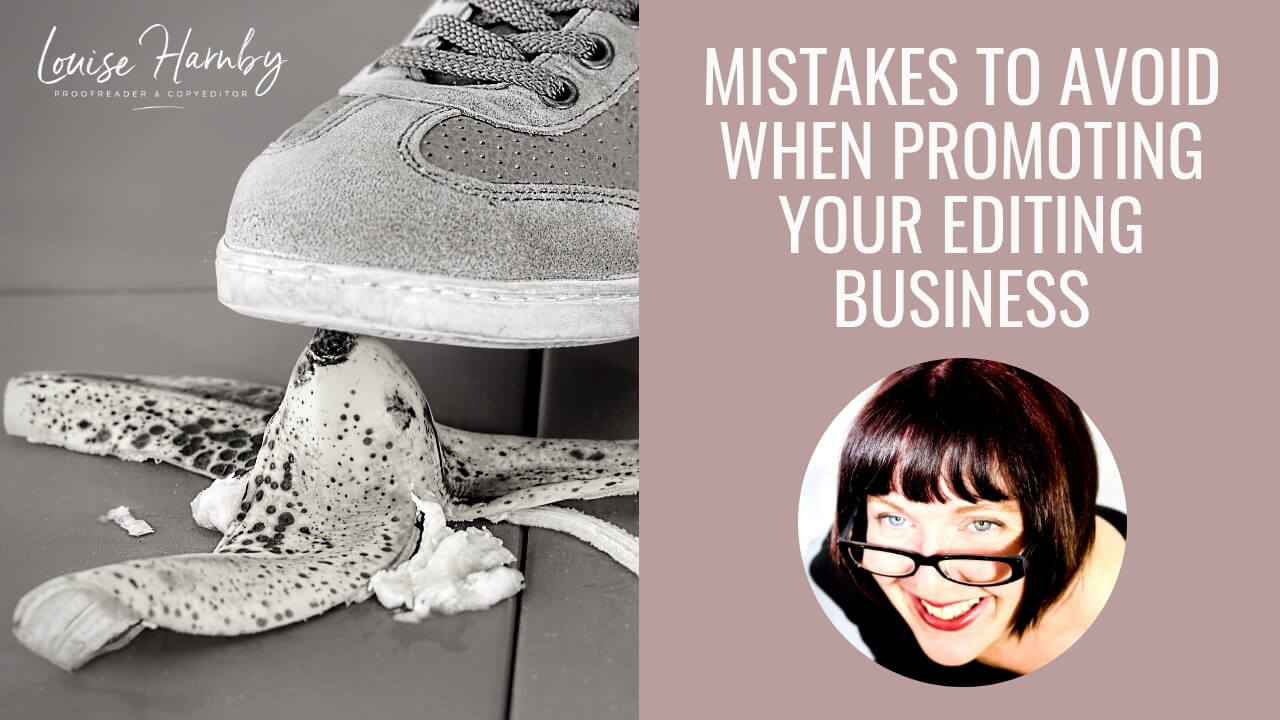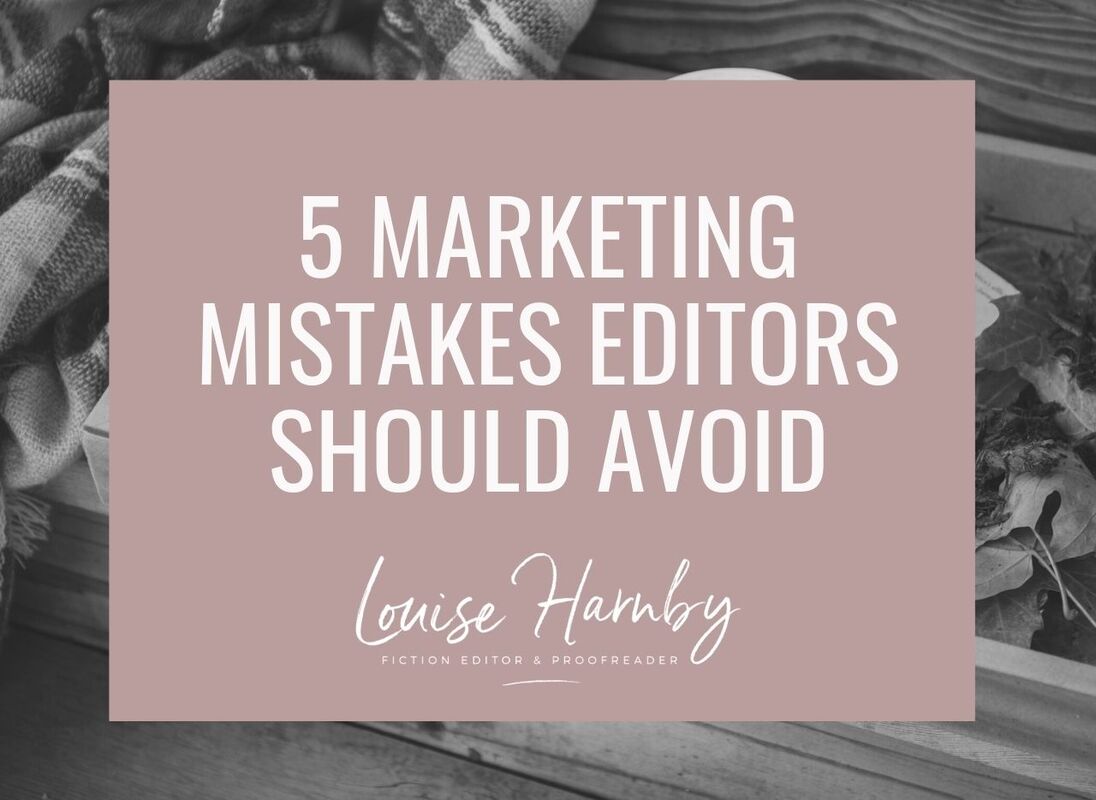|
There many different and effective approaches to marketing an editing and proofreading business. There are several ways to make a hash of it too. Here are five mistakes that you should avoid, not just at launch stage but once your business is up and running.
Mistake 1: Not actually doing any marketing
Here are three ideas that I think we should embrace when launching an editorial business:
Let’s say I’ve completed the relevant training, acquired the kit I need, worked out who my target clients are, notified the tax authorities of my business plans, acquired some experience via my mentor, designed my stationery templates, created my accounting spreadsheet, and hired a professional designer to produce a fabulous logo. Now I need the clients. That means they need to be able to find me and I need to be able to find them. If ne’er the twain meet, I’m unemployed. Being discoverable is the first step to the success of any business, editorial or otherwise, because it bridges the gap between the services we offer and the people who need them. The second step is being interesting enough to retain the potential customer’s attention. Having found us, our potential clients need to feel they want to go further and actually hire us to solve their problems. No matter how much the thought of actively promoting your editorial business sends shivers up your spine, to not do so is a mistake. Marketing your business gives you opportunity and choice. It puts you in a position where, over time, you can develop the client base, pricing strategy, service portfolio and income stream that you require and desire.
Mistake 2: Stopping marketing when you have work
If the cupboard is full, this isn't the time to put business promotion on the back-burner. I know it might feel like the perfect time to take a breather, but trust me, it really isn't!
A healthy business is a sustainable business. Not knowing what's round the corner is about surviving not thriving, and that's stressful. Emergency marketing forces us to rush. We don't always make the best choices when we're anxious. Panic can even lead to inertia. Plus, we might find there's a lot to do and only a small window in which to do it. For example, one tactic for emergency marketing is contacting lots of publishers. However, gathering all the information required to do that effectively is time-consuming. If we build marketing time into our schedule when the cupboard is full, we can pace our plans so that we do a little on a regular basis rather than a lot all at once. That's a far more pleasant and productive way to tackle business promotion and helps us build a wait-list.
Mistake 3: Marketing via a single platform
Relying on only one particular channel to make yourself discoverable to your clients is better than not doing any marketing at all. But it’s hugely risky – if that platform fails, so do you. One of my most valuable marketing assets is my website. It’s my shop front and it’s the only space in which I have complete control over the content and design. I’ve put a lot of effort into making it visible so that I can be found and visited. I use Weebly as my host. But what if the folks at Weebly ran into some horrendous problem and the site was inaccessible for a few days, or even a few weeks? It’s unlikely to happen, but even if it did it wouldn’t be catastrophic because I don’t rely solely on my website for work leads. It’s simply one tool among several.
EXAMPLE
James used to work for a major academic publisher but now he's gone solo and launched his new editorial business. He asks a former colleague who works in the journal production department if he can proofread for her. She agrees. The publisher has a huge journal list and his colleague keeps him busy with as much proofreading as he needs. He doesn't solely work for this press (here in the UK, HM Revenue & Customs wouldn’t like that) but it does supply him with most of his work and most of his income. Then double disaster strikes – the press merges with a competitor, and his colleague is made redundant. She gets a job for another press, though her new role no longer requires her to hire editorial freelancers. James doesn't know anyone in the newly merged organization (though rumour has it the press is taking journal proofreading in-house in order to cut costs). Plus, his former colleague can’t take him with her to the new press. He's scuppered. James won't let that happen again. He does the following:
Even if you’ve been able to establish a couple of seemingly stable and lucrative work streams, and you’ve found that one particular marketing platform or tool works well for you, take the time to investigate other channels. At the very least they’ll provide you with a backup. Moreover, by experimenting with new avenues, you could find that clients whom you’d been invisible to beforehand now have you on their radar. That means more opportunities and more choice.
Mistake 4: Focusing attention in the wrong place
Some new entrants to the field can make the mistake of giving information that focuses potential clients’ attention in the wrong place. Instead, focus on stand-out statements.
EXAMPLE
A well-educated material scientist has decided, for health reasons, to move out of the professional lab and work from home, copy-editing written materials relevant to his scientific educational and career background.
His clients don’t need to know most of the above because most of those facts don’t represent him in the best light. Instead, he should focus on his stand-out qualities and present them in a way that's client-centric.
If what you say doesn’t make you compelling, don't say it. Show how you can solve clients' problems. It should be all about them and what you can do for them. If you lack experience and an extensive portfolio, focus instead on positive selling points that make the client feel confident about hiring you to fix what they can't. Sell your positives, not others’ negatives It’s also imperative that your message does indeed focus on what you can do for the client. Just in case you are one of the few people on the planet who thinks that highlighting a competitor’s or colleague’s mishaps rather than your own skills is a good marketing strategy (I’m sure you’re not!), then here's a quick reminder about why it’s disastrous in terms of PR.
Mistake 5: Ignoring traditional marketing methods
Before Tim Berners-Lee invented the World Wide Web in 1989, editorial professionals had to promote their businesses using telephone and postal services, face-to-face meetings, and onsite networking groups. These methods worked then, and they still work now – don’t make the mistake of ignoring them in the belief that they’re out-dated. Social media profiles, websites, and emails are all excellent ways to make yourself discoverable, and the twenty-first century editor should embrace them. Bear in mind, however, that from the client’s point of view they're as easy to discard as they are to access, precisely because they're digital methods of contact. Consider also the following:
Balancing immediacy and permanence is key to a well-rounded marketing strategy. By using a mixture of the two, you'll enhance your visibility and spike a client's interest. Summing up
Louise Harnby is a line editor, copyeditor and proofreader who specializes in working with crime, mystery, suspense and thriller writers.
She is an Advanced Professional Member of the Chartered Institute of Editing and Proofreading (CIEP), a member of ACES, a Partner Member of The Alliance of Independent Authors (ALLi), and co-hosts The Editing Podcast. Visit her business website at Louise Harnby | Fiction Editor & Proofreader, say hello on Twitter at @LouiseHarnby, connect via Facebook and LinkedIn, and check out her books and courses.
2 Comments
Those of you with whom I'm connected on Facebook, Twitter and LinkedIn will have seen my sharing of several posts written in the past few months by my colleague, technical writer John Espirian, on the Espirian blog.
I follow a number of editorial blogs, though I haven't added all of them to my blogroll because I need to keep the list manageable. I've added this one, however, because it offers me something a little different. I like technology because, when it works, it allows me to run my business more easily, more productively, and more efficiently. I like reading advice about digital editorial tools (such as macros, markup stamps, and Word shortcuts), and I particularly like it when someone helps me to understand things that I'd previously considered beyond my technical know-how. I'm a non-techie person who likes techie things but is sometimes wary of using them because I don't have the time or inclination to take them on unless someone can spell it out for me in my language! This is the niche that Espirian is filling.
Louise Harnby is a fiction line editor, copyeditor and proofreader who specializes in supporting self-publishing authors, particularly crime writers. She is an Advanced Professional Member of the Society for Editors and Proofreaders (SfEP) and an Author Member of The Alliance of Independent Authors (ALLi).
Visit her business website at Louise Harnby | Proofreader & Copyeditor, say hello on Twitter at @LouiseHarnby, or connect via Facebook and LinkedIn. |
BLOG ALERTSIf you'd like me to email you when a new blog post is available, sign up for blog alerts!
TESTIMONIALSDare Rogers'Louise uses her expertise to hone a story until it's razor sharp, while still allowing the author’s voice to remain dominant.'Jeff Carson'I wholeheartedly recommend her services ... Just don’t hire her when I need her.'J B Turner'Sincere thanks for a beautiful and elegant piece of work. First class.'Ayshe Gemedzhy'What makes her stand out and shine is her ability to immerse herself in your story.'Salt Publishing'A million thanks – your mark-up is perfect, as always.'CATEGORIES
All
ARCHIVES
July 2024
|
|
|
|





















 RSS Feed
RSS Feed





